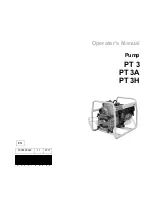
3.5.
Select the required direction of rotation. To change direction, turn the
change direction, turn the direction selector to the left or right.
DO NOT
attempt to
change the direction of rotation whilst trigger is depressed.
3.6.
3.6.
Speed can be controlled by varying the finger pressure on the trigger. Initial pressure will switch on the worklight.
3.7.
The trigger can be locked in the off position when required to prevent accidental use.
3.8.
When tightening, take care not to over-torque small fixi
When tightening, take care not to over-torque small fixi
ngs.
Note:
On critical fixings always check the torque with a torque wrench according to the product or vehicle manufacturer’s guidelines.
4. MAINTENANCE
WARNING!
Remove battery from tool before performing any maintenance
or making adjustments.
4.1.
Remove dust with a soft bristled brush.
8
DO NOT
use solvents clean with a soft damp cloth.
DO NOT
use
compressed air (risk of ejection).
4.2.
Tool does not require any special maintenance (it is permanently
lubricated inside). Professional repair only, contact authorised service
centre.
4.3.
STORAGE
4.3.1.
Store in a child free,dry location.
WARNING! – Risk of Hand Arm Vibration Injury.
This tool may cause Hand Arm Vibration Syndrome if its use is not managed
adequately.
This tool is subject to the vibration testing section of the Machinery Directive
2006/42/EC.
This tool is to be operated in accordance with these instructions.
Measured vibration emission value (a): 11.64m/s²
Uncertainty value (k): 1.5m/s²
Please note that the application of the tool to a sole specialist task may
produce a different average vibration emission. We recommend that a
specific evaluation of the vibration emission is conducted prior to commencing
with a specialist task.
A health and safety assessment by the user (or employer) will need to be
carried out to determine the suitable duration of use for each tool.
NB: Stated Vibration Emission values are type-test values and are intended
to be typical. Whilst in use, the actual value will vary considerably from and
depend on many factors. Such factors include; the operator, the task and the inserted tool or consumable.
NB: ensure that the length of leader hoses is sufficient to allow unrestricted use, as this also helps to reduce vibration.
The state of maintenance of the tool itself is also an important factor, a poorly maintained tool will also increase the risk of Hand Arm
Vibration Syndrome.
Health surveillance.
We recommend a programme of health surveillance to detect early symptoms of vibration injury so that management procedures can be
modified accordingly.
Personal protective equipment.
We are not aware of any personal protective equipment (PPE) that provides protection against vibration injury that may result from the
uncontrolled use of this tool. We recommend a sufficient supply of clothing (including gloves) to enable the operator to remain warm and
dry and maintain good blood circulation in fingers etc. Please note that the most effective protection is prevention, please refer to the
Correct Use and Maintenance section in these instructions. Guidance relating to the management of hand arm vibration can be found on
the HSC website www.hse.gov.uk - Hand-Arm Vibration at Work.
Original Language Version
© Jack Sealey Limited
C
P108VCRWBO Issue 1 02/02/21
Sealey Group, Kempson Way, Suffolk Business Park, Bury St Edmunds, Suffolk. IP32 7AR
01284 757500
01284 703534
www.sealey.co.uk
Note
: It is our policy to continually improve products and as such we reserve the right to alter data, specifications and component parts without prior
notice.
Important
: No Liability is accepted for incorrect use of this product.
Warranty
: Guarantee is 12 months from purchase date, proof of which is required for any claim.
ENVIRONMENT PROTECTION
Recycle unwanted materials instead of disposing of them as waste. All tools, accessories and packaging should be sorted, taken to
a recycling centre and disposed of in a manner which is compatible with the environment. When the product becomes completely
unserviceable and requires disposal, drain any fluids (if applicable) into approved containers and dispose of the product and fluids
according to local regulations.
WEEE REGULATIONS
Dispose of this product at the end of its working life in compliance with the EU Directive on Waste Electrical and Electronic Equipment
(WEEE). When the product is no longer required, it must be disposed of in an environmentally protective way. Contact your local solid
waste authority for recycling information.




















